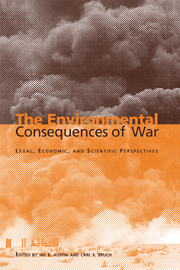Book contents
- Frontmatter
- Contents
- List of illustrations
- List of tables
- List of contributors
- Acknowledgements
- Foreword by Klaus Toepfer
- Introduction
- Part I General principles
- Part II The legal framework
- Introduction
- 2 The law of war and environmental damage
- 3 War and the environment: fault lines in the prescriptive landscape
- 4 The inadequacy of the existing legal approach to environmental protection in wartime
- 5 United States Navy development of operational-environmental doctrine
- 6 In furtherance of environmental guidelines for armed forces during peace and war
- Introduction
- 7 Peacetime environmental law as a basis of state responsibility for environmental damage caused by war
- 8 Environmental damages under the Law of the Sea Convention
- 9 The place of the environment in international tribunals
- 10 Civil liability for war-caused environmental damage: models from United States law
- Part III Assessing the impacts – scientific methods and issues
- Part IV Valuing the impacts – economic methods and issues
- Part V Prospects for the future
- Index
5 - United States Navy development of operational-environmental doctrine
Published online by Cambridge University Press: 04 August 2010
- Frontmatter
- Contents
- List of illustrations
- List of tables
- List of contributors
- Acknowledgements
- Foreword by Klaus Toepfer
- Introduction
- Part I General principles
- Part II The legal framework
- Introduction
- 2 The law of war and environmental damage
- 3 War and the environment: fault lines in the prescriptive landscape
- 4 The inadequacy of the existing legal approach to environmental protection in wartime
- 5 United States Navy development of operational-environmental doctrine
- 6 In furtherance of environmental guidelines for armed forces during peace and war
- Introduction
- 7 Peacetime environmental law as a basis of state responsibility for environmental damage caused by war
- 8 Environmental damages under the Law of the Sea Convention
- 9 The place of the environment in international tribunals
- 10 Civil liability for war-caused environmental damage: models from United States law
- Part III Assessing the impacts – scientific methods and issues
- Part IV Valuing the impacts – economic methods and issues
- Part V Prospects for the future
- Index
Summary
Introduction
Protection of the environment during training and operations is an important priority of the United States Navy. Maintaining the appropriate balance between environmental protection and mission achievement is a complex proposition, as the focus of operations shifts along the continuum from peacetime training, to military operations other than war, to warfare itself. This chapter describes the United States Navy's efforts – in concert with other military services, the Joint Staff, and international military organizations – to develop environmental protection doctrine and policy that provides appropriate guidance for operational staff and leaders in this critically important area. This chapter gives substantial treatment to military operations other than war (MOOTW).
First, this chapter helps to identify the essential linkages through which legal principles pertaining to the protection of environment in military operations are given real-world effect. Clear international consensus on appropriate norms for environmental protection during war, even if achievable, would be considerably less effective without meaningful translation of those norms into military doctrine and policy governing battlespace practice. Environmental protection can be much more efficiently achieved through prevention of environmental injury in the first place (a result of enlightened operational decisionmaking) than through post-conflict damage assessment, recovery from and/or prosecution of responsible parties, and efforts to remedy the damage.
Second, for the foreseeable future the prospect of all-out world war – full-scale multinational conflict on several continents – is thankfully minimal. By contrast, it is virtually certain that most nations will continue to conduct military training and exercises, and that many states will periodically engage in large-scale military operations other than war.
- Type
- Chapter
- Information
- The Environmental Consequences of WarLegal, Economic, and Scientific Perspectives, pp. 156 - 170Publisher: Cambridge University PressPrint publication year: 2000
- 1
- Cited by

